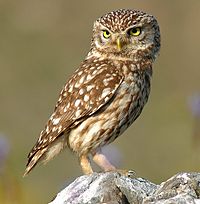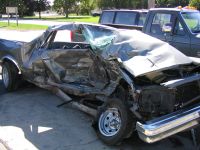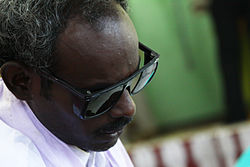Preconceived ideas?
Consider the following pictures carefully then choose whether you associate each picture with good or bad news; a good or bad omen; or no association. Think about your answers as well as why you have made the particular choice.
Picture 1
- What is your personal association with this bird of prey?
- Good news or good omen
- Some cultures associate the image of an owl with wisdom and could associate the acquisition of knowledge and experience as "good". In the modern west, the owl is often a symbol of wisdom. Did you associate this with a good omen, and why? Feel free to share your thoughts by posting on
 identi.ca, twitter or WEnotes and remember to include the #OERuCR2 in your post.
identi.ca, twitter or WEnotes and remember to include the #OERuCR2 in your post.
- Bad news or bad omen
- Some cultures associate the owl with a messenger of death. For example, among the Kikuyu of Kenya it was believed that owls were harbingers of death. Did you associate this image with bad news. If so why? Feel free to share your thoughts by posting on
 identi.ca, twitter or WEnotes and remember to include the #OERuCR2 in your post.
identi.ca, twitter or WEnotes and remember to include the #OERuCR2 in your post.
- No particular association
- Depending on your own background, upbringing and culture you may not associate any particular message of good or bad with this image. However, the owl can be associated with good and bad omens depending on background and belief systems. Click above to see.
Picture 2
What is your association with the colour of this cat?
.
- Click on all the options below to see how your association compares.
- Good news / good omen
- In Great Britain and Ireland, for example, black cats are a symbol of good luck.
- Bad news / bad omen
- In many parts of western and southern Europe, the black cat is considered a symbol of bad luck, especially if one crosses paths with a person, which is believed to be an omen of misfortune.
- No particular association or both good and bad?
- Consider for example that some people in Germany, believe that black cats crossing a person's path from right to left, is a bad omen. But from left to right, the cat is granting favorable times!
( : I recommend using a separate activity template for each image. More flexibility for structuring the pages. --Mackiwg 05:41, 23 October 2012 (UTC))
: I recommend using a separate activity template for each image. More flexibility for structuring the pages. --Mackiwg 05:41, 23 October 2012 (UTC))
Alternative for the accident riddle
Try you luck with this riddle
"A man and his son are driving together on a stormy night. They have an accident in which the father is killed and his son badly injured. The boy is taken to the local hospital and requires urgent surgery. He is prepared for the operation and wheeled into the theatre. The surgeon arrives, looks at the boy and says, “I cannot operate on my own son”.
How is this possible?
- Fill in blanks. Use your cursor or "tab" key to advance to the next answer. Refresh your browser to try again.
- The man is the boy's father
- The boy is the surgeon's son
- The surgeon is the boy's mother
Ask a few friends, colleagues or family. See how they fair with the same riddle.
Microblog activity for the accident riddle
Another example
Sound reasoning?
Consider the following claims (or opinions) about two people from different backgrounds.
- Claim 1
- Peter grew up in the wealthy northern suburbs of Johannesburg.
- Therefore, Peter is likely to believe in the values of individuality and the superiority of capitalism.
- Claim 2
- Paul grew up in the poor suburb of Alexandra.
- Therefore, Paul is likely to believe in the value of community and the superiority of socialism.
- Now answer the questions that follow:
- Do you think that these claims are based on sound reasoning? Also think about why? or why not?
- Yes
- Incorrect. The relationship may appear plausible to some, however they are not based on refective critical reasoning. The claims are based on preconceived ideas.
- No
- Correct. These claims are not outcomes of reflective critical reasoning. They're based on preconceived ideas.
- What, if any preconceived ideas underpin the two claims above? Can you identify them? Write them down before consulting the feedback below.
- Select to display feedback. How does your answer compare?
- The two claims are assumptions based on preconceived ideas about socioeconomic class, personal identity and values. How did your answer compare? Let us know by posting on
 identi.ca, twitter or WEnotes and remember to include the #OERuCR2
identi.ca, twitter or WEnotes and remember to include the #OERuCR2
Reworked example for labelling
Reflection
Consider the following example of labelling and then respond to the questions that follow:
| “
|
I knew a man who had lost the use of both eyes. He was called a “blind man”. He could also be called an expert typist, a conscientious worker, a good student, a careful listener, a man who wanted a job. But he couldn’t get a job in the department store order room where employees sat and typed orders which came over the telephone. The personnel man was impatient to get the interview over. “But you’re a blind man,” he kept saying, and one could almost feel his silent assumption that somehow the incapacity in one aspect made the man incapable in every other. So blinded by the label was the interviewer that he could not be persuaded to look beyond it.
|
”
|
| —Allport 1954
|
Jot down your thoughts to the following questions:
- Do you think that the outcome of the interview would have been different if the interviewer was aware of the obstacle of labelling?
- What is your opinion about labelling people?
|
Microblog activity for labelling reflection
Activity
The following are some of the answers we received when we asked this question of different people:
- Person X: "I think it is stupid, although I have to admit it I also do it, but I think it is better to get to know a person before you make judgments."
- Person Y"Labelling people dehumanises them. However, sometimes this might be appropriate to do, (paedophiles, rapists, etc), but for the most part it is not."
- Person Z:"I think it’s wrong. But I don’t care if other people do it. I just don’t. I feel that puts me above everyone else in that way."
What do you think? Share your thoughts with fellow learners by posting on  identi.ca, twitter or WEnotes and remember to include the #OERuCR2 tag, for example: identi.ca, twitter or WEnotes and remember to include the #OERuCR2 tag, for example:
- I agree with Person ?? (insert X, Y or Z) because ..... #OERuCR2
- I agree with Y's answer because ..... #OERuCR2
- I disagree with Y's answer because .... #OERuCR2
|
![]() : I recommend using a separate activity template for each image. More flexibility for structuring the pages. --Mackiwg 05:41, 23 October 2012 (UTC))
: I recommend using a separate activity template for each image. More flexibility for structuring the pages. --Mackiwg 05:41, 23 October 2012 (UTC))



